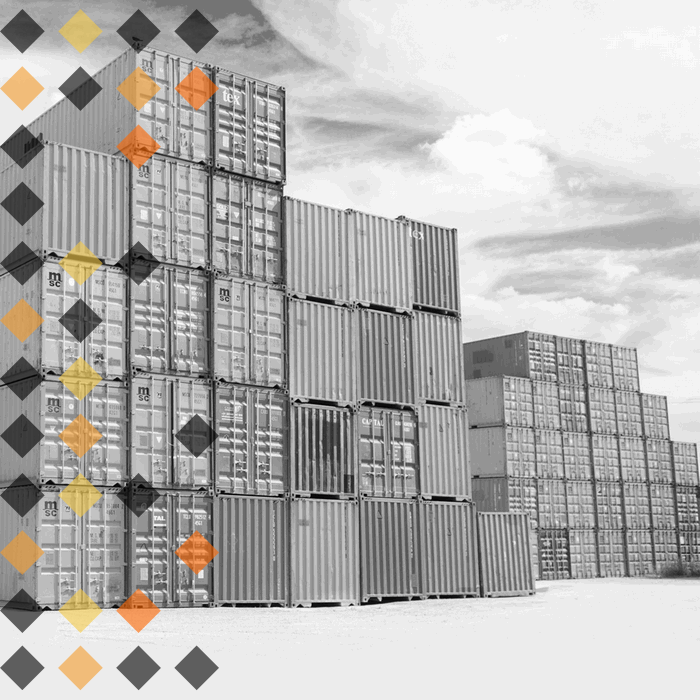Warehouse Logistics | What it is and How to Use it Properly
The growth of eCommerce in 2021 increased the demand for warehouse logistics and forced the implementation of digital trends for the industry. For warehouse logistics, it brings new challenges, as it means that companies need to manage the space for products and accurately navigate shipment processes. This article will point out the basic principles of the industry, outline the main types and solutions in warehouse logistics, and focus on a Cprime expertise in implementing logistics software solutions into actual cases.
What is Warehouse Logistics
Warehousing and logistics often combine into one term. At the same time, those processes are two sides of the same coin. On the one side warehousing is focused on the storage of goods and products. Logistics is primarily the process of managing, shipping, and delivering these goods for the final clients. Furthermore, this process must work in tandem to ensure that the clients get the goods in time and with a high quality of delivery.
What is warehouse logistics? First of all, it is a complicated process of managing the storage, planning, organizing, and navigating the delivery process. Nowadays, there are a lot of digital trends that influence logistics and help to achieve business goals. Modern warehouse logistics software combines AI and machine learning principles, using data science technologies to analyze the supply chain and solve business problems.
Implementing warehouse logistic software solutions has many benefits, such as:
- accurate and real-time inventory counting
- optimized warehouse space
- better relationship with customers
- fewer returns
- optimized resources for management automatization
How to Budget Warehouse Logistics
First, the сompany must understand all the limitations and potential costs in the early stage. It is challenging for the business to create advanced warehouse logistics for existence supply chains and fit all the customers’ needs. It is essential to have a business development strategy and outline the goals for the future logistics warehousing solution.
Before budgeting the warehouse logistics, the company needs to analyze some basic cost categories for accurate budgeting.
- Software license. Your software can have unrestricted permission, or it can depend on the types of warehouses, amount of goods, and frequency of logistic operations.
- Optional modules. You can choose a ready solution or focus on creating custom software for achieving your business goal. The cost of custom development is usually higher. At the same time, if the software fits all the company’s needs, it will save money in the future.
- Server hardware or hosting. The software can be located in the cloud or the server, and the cost for those solutions will be different.
- Maintenance. Logistics warehouse optimization is an ongoing process that depends on several factors. You need to understand that the software will be modified for different circumstances, and it will influence the cost of the solution. Also, you will need DevOps support in implementing new modifications into the software.
At the same time, you can never predict additional costs for running a logistic warehouse solution. On average, it can be 20% of your final budget.
Three Main Types of Warehouse Logistics
As we already mentioned, warehouse logistics is a complicated process that compels many management operations. There are three main types of warehouse logistics we will discuss more in detail next.
Warehouse Management
It is strategic, operational work in the warehouse that focuses on improving operational efficiency. Logistics warehouses management aims to observe staff, organize training and inventory, and build communication with shipping companies and other partners. Warehouse management responsibilities also include:
- Forecasting and managing project labor.
- Getting license and certification for logistic operations.
- Ensuring safety measures in the warehouses.
This type of logistics also focuses on managing the warehouse space and collecting information about the shipment.
Warehouse Operations
This process is based on moving the goods and tracking the inventory in the warehouse. The basic principles of this type of logistics in a warehouse are receiving the products, placing them in separate locations, and shipping them to the next destination point. Efficient warehouse operations ensure the low cost of storage, in-time delivery, optimized warehouse space, and good relationship with clients.
Warehouse Management Systems
A warehouse management system (WMS) is a software solution that helps to manage all logistic processes, get accurate analytics, and navigate the process in real-time. Advanced software solutions are based on implementing AI and data technologies. DevOps process on WMS design depends on custom business goals, but in most cases, the software will help make a strategic design, operate the process from the UX dashboard, and collect all the information on warehouse logistics in one space.
What are Warehouse Logistics Solutions?
Warehouse logistics solutions give the possibility to track the inventory in real-time and manage the supply chain. Next, we will point out the most commonly used keys for logistic warehousing optimization.
- Warehousing. This is a possibility of long-term storing the inventory. It helps businesses with B2B eCommerce orders. Usually, this logistic solution allows storage equipment for product organizers and can vary on the short-term or long-term lease commitment.
- Inventory management. This solution is focused on monitoring the products and tracking the inventory. Inventory software makes the information analysis and helps in forecasting.
- Using fulfillment services. It covers all steps in the logistic process, such as warehousing, inventory management, packing, shipping, and facilitating returns. At the same time, this solution does not solve a long-time storing problem.
- Third-party logistics. Not every company needs to have its own warehousing logistics software and management system. In some cases, you can use a third-party service for improving supply chain and shipment processes. Such services will connect the eCommerce store with software tools for better managing and improving logistics.
Our Case
Cprime warehouse and logistic software design expertise are based on creating efficient solutions for well-known businesses. One of the latest successful cases was creating a BI warehouse managing app with Acinta Intelligence Suite. The challenge for this project was to develop a set of app for data analysis from the end user’s warehouse database. This software must advise businesses to analyze commercial context accurately. Cprime was Acinta Intelligence Suite’s development partner in this case, as Acinta does not have an in-house development department.
To create the software that will provide accurate data for centralized business reporting (for example, Key Performance Indicators or reports), we built a system with four main applications. It combines a data shop, modeler, enterprise manager, and an Acinta server. The system allows users to get real-time data, explore trends, and business opportunities.
The system has a few features that ensure efficient application for business processes. First of all, data shop can be a flexible tool for extracting information that can help to improve business decisions. A modeler is a user-friendly tool that allows the creation of a multidimensional model of warehouse data. This system also integrates with Microsoft Dynamics C5, Microsoft Dynamics Navision, Microsoft Dynamics Axapta, Visma Business, Magento. Moreover, Acinta Service allows users to publish information online and send accurate reports.
To sum up, this use case illustrates how the combination of best logistic software solutions became an efficient tool in business analytics.
Conclusion
Warehouse logistics is a complicated process that is connected to the eCommerce market. With the growth of online shopping worldwide, many companies needed to increase the space for efficient shipment and storage of products. At the same time, many advanced software solutions help to navigate inventory management and advise businesses in implementing the best logistic solutions.
If you’re interested in developing or integrating with a warehouse logistics system, speak to a Cprime development expert today.



